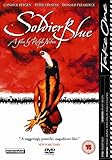Eye For Film >> Movies >> Soldier Blue (1970) Film Review
The sole survivors of an attack by the Cheyenne try to make their way to the nearest fort. On the journey Cresta Lee (Candice Bergen) and Private Honus Gent (Peter Strauss) get to know each other. She tells him of the atrocities committed by the American army and he calls her a traitor once or twice, then listens carefully.
Soldier Blue's intentions are laudable, but the end result is laughable. I'm all for it redressing the "Injuns are savages" message from so many other Westerns and I'm all for its allegorical questioning of the Vietnam War, but I wish it wouldn't do it in such a jejune manner that undermines what it's attempting to espouse.
As a Western, the characters are far too anachronistic. It would be little surprise to hear Cresta say to Honus, "Get with the programme, Soldier Blue. The Man has been lying to you." As an allegory, it's simplistic, patronising and wasteful.
Without exception, the characters are one-dimensional. We have a strong woman, who has seen horrors done in the name of America. Her travelling companion is a simple soldier, who thinks his country is great. Her fiance (Dana Elcar) is a captain in the army. An old colonel (John Anderson) plans a raid on a Cheyenne village and a Cheyenne warrior (Jorge Rivero) believes he can make peace with the Americans, but will be betrayed. The least said about Donald Pleasence and his comedy teeth the better. He plays a calico salesman by the name of Isaac Q. Cumber (cucumber, geddit?).
Almost every two minutes Cresta scornfully calls Honus "Soldier Blue." It doesn't take a genius to work out that she'll be talking in a different tone quite soon, such as, "Oh Soldier Blue, you're so dreamy", or "Well, what do you think of your country now, Soldier Blue?"
Both expected moments occur; both are as facile as everything else. The mournful moment might have worked a better if it didn't look like a lot of extras had spilled red paint on themselves.
The film's one redeeming feature is that the scenery looks beautiful. All Westerns have beautiful scenery. You'd be better off with any one of the others.
Soldier Blue is somewhat notorious, and even to this day 23 seconds have been cut by the BBFC. My review copy, however, was uncut, which gave me an opportunity to see the film as it was intended and find out for myself if its notoriety is justified.
I am at a loss to explain why there would be cuts. Three incidents of "animal mistreatment" have been erased from the version released to the public. These are, presumably, horses falling over during battle scenes. I simply couldn't tell you which three of the 10, or 12, horses falling over throughout the course of the film cross the line of mistreatment. Either they're all mistreating horses, or none of them are. And what of every single Western that has ever been? And what of the Grand National? They're as bad as Soldier Blue.
The other cut is of a rape scene during the Sand Creek massacre. Naturally, it's harrowing, but it's neither glorifying rape, nor being gratuitous. It's integral to the plot; it's contextualised; it's neither made light of, nor made horrifically graphic. Without it, subsequent scenes showing a topless dead body could be perceived as pornographic.
It's been a long time since I saw Jodie Foster in The Accused, but as far as I can remember that was far more graphic and far more shocking.
Soldier Blue is a silly little film that tries to be deep and fails miserably. Thirty-five years after it was made, the British public still cannot see the only scene that rings true. Madness.
Reviewed on: 19 Mar 2005


















